General Blog Posts

Specifying Boundary Conditions and Constraints in Variational Problems
In part 2 of a blog series on solving variational problems in COMSOL Multiphysics®, we discuss how to specify general boundary conditions and constraints.

Introduction to Modeling Soap Films and Other Variational Problems
In this introduction to a 5-part series, learn how to solve variational problems using equation-based modeling, which is useful for modeling soap films, catenary cables, light beams, and more.
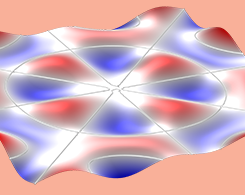
How Do Chladni Plates Make It Possible to Visualize Sound?
Is it possible to see sound? Find out for yourself in this blog post on the acoustics behind Chladni plates.

How to Analyze a Glacier via Gradient-Based Optimization
This post highlights a gradient-based optimization method that geophysical engineers can use to analyze, for instance, the movement and sensitivity of a glacier.

Optimizing Thermal Processes in Carbon Manufacturing with Simulation
A guest blogger from SGL Carbon GmbH demonstrates how his organization uses heat transfer simulation to optimize thermal processes in carbon manufacturing.
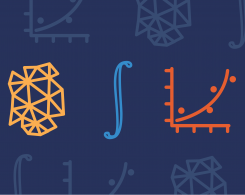
Your Guide to Meshing Techniques for Efficient CFD Modeling
Learn how to use a variety of meshing tools for your CFD analyses, including mapped mesh, unstructured quad mesh, triangular mesh, tetrahedral mesh, swept mesh, boundary layer mesh, and more.

How to Use the Cluster Sweep Node in COMSOL Multiphysics®
Keep your cluster admin happy by using the Cluster Sweep node in COMSOL Multiphysics® to optimize the parallelization of parametric computations on clusters.

How to Set Up a Mesh in COMSOL Multiphysics® for CFD Analyses
As a flow mechanics specialist preparing a mesh for CFD analysis, the geometry supplied by a CAD team is often exactly what you do not want. So, what do you do?

How to Create Animations Along the Azimuthal Direction for 3D Models
Here’s a useful postprocessing trick for presenting your 3D modeling results: combine slice plots along the azimuthal direction in order to generate a nontrivial animation.
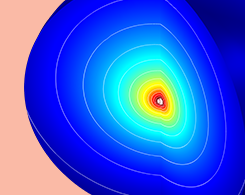
What Is the Doppler Effect?
A siren passes by and you hear a change in pitch. A bug swims across a puddle, causing ripples on the surface. A star in the sky has a reddish hue. These are all examples of the Doppler effect.

How to Search for a Specific COMSOL Multiphysics® Application
The Application Libraries in the COMSOL® software contain a variety of examples that demonstrate specific features and modeling techniques. Learn how to quickly search for a specific one.
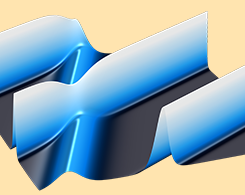
Chasing Waves: The Story of John Scott Russell and the KdV Equation
It all started with a horse: Learn about the history and use cases for solitons, as well as the life and work of the naval architect behind the KdV equation: John Scott Russell.

Teaching Students About Acoustics Phenomena with Apps
Acoustics concepts and their underlying theories can be difficult for engineering students to visualize. For one university, simulation applications proved to be an effective teaching tool.

How to Perform Multimaterial Optimization in COMSOL Multiphysics®
Does a tuning fork sound better when made out of aluminum instead of copper or steel? In COMSOL Multiphysics®, you can perform an optimization study for multiple materials to find out.

How to Use the Parameter Estimation Study Step for Inverse Modeling
This blog post includes a tutorial video. Watch it to learn the steps for performing a parameter estimation study for inverse modeling in COMSOL Multiphysics®.
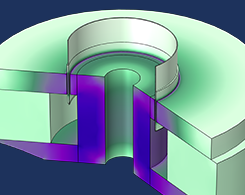
Topology Optimization of a Magnetic Circuit for Loudspeakers
By optimizing the topology of loudspeaker components, such as magnetic circuits, we can develop speaker designs that are portable, lightweight, and high quality.

How to Use Interpolated Material Data to Model Irregular Geometries
Learn how to model an irregular geometry in COMSOL Multiphysics® by importing material data. The example featured here is for an RF simulation of a human head.

How to Run on Clusters from the COMSOL Desktop® Environment
You can run large simulations remotely on HPC hardware directly from the COMSOL Desktop® graphical environment. Learn how in this tutorial blog post.

Advancing Additive Manufacturing with Sequential Simulations
In some ways, additive manufacturing is like sewing or weaving. We talk to a professor of additive manufacturing about how sequential simulations can be used to analyze and optimize the process.

Acoustic Topology Optimization with Thermoviscous Losses
A guest blogger from GN Hearing discusses including thermoviscous losses in the topology optimization of microacoustic devices, such as hearing aids, mobile phones, and metamaterial geometries.
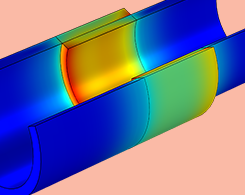
Optimizing the Interference Fit Between 2 Pipes with Structural Analyses
The interference fit between 2 pipes can’t be too tight or too loose. Like the porridge in the “Goldilocks and the Three Bears” story, it has to be just right.

Predicting Solute Transport in Groundwater Using Simulation
In order for groundwater to be useful for irrigation and drinking, we need to understand how its various solutes move through the water. The Subsurface Flow Module includes features for this.

Model Deforming Objects with the Arbitrary Lagrangian-Eulerian Method
The combined efforts of Leonhard Euler and Joseph-Louis Lagrange inspired the arbitrary Lagrangian-Eulerian (ALE) method, which we can use to model deforming objects.
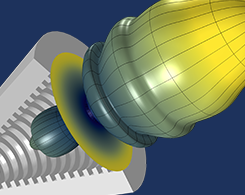
A Simulation Color Table for Engineers with Color Vision Deficiency
Simulation results often use color to present data and emphasize certain takeaways, but what about engineers with color vision deficiency? Cividis is a color table designed specially for this.
